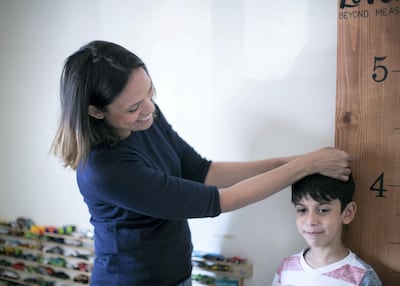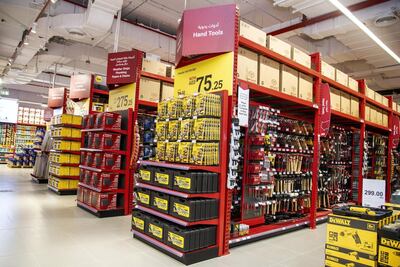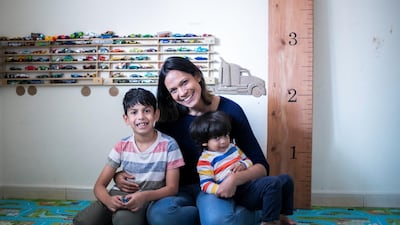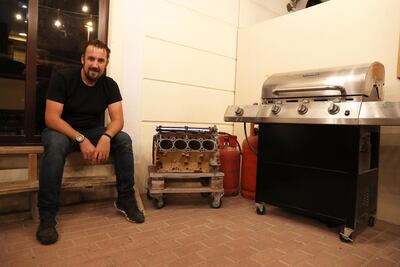When busy mother Amanda Dias set about organising her two sons’ rapidly expanding collection of model cars, she decided to build the solution herself.
While the motivation was more out of a need to store the colourful toys in a practical way, the cost savings of her do-it-yourself project were significant.
“I used a shoe stand to create a shelf and added a cardboard truck to complete it,” says Ms Dias, a soft skills corporate trainer by profession.
“This would have cost Dh250 to Dh350 – I made it for Dh15.”
Ms Dias is part of a growing group of people seeking to save money amid a challenging economy by tackling jobs and home improvement projects they might once have paid professionals to do.
Among the Dubai resident’s other projects is a giant height board, designed and regularly used for measuring her growing boys, aged two and six years. She made it for Dh150, compared with an estimated cost of Dh600 to Dh800 had she hired a professional.
Ms Dias had long been creating smaller, often arty items, at her home in Mirdif, Dubai, but that project sparked a range of DIY missions of varying complexity.
This included a bookshelf constructed from disused wooden pallets; something that cost Dh50 to build and resulted in savings of about Dh300 to Dh450.
"I also made a Game of Thrones mobile stand that would have probably cost Dh150, for just Dh40," says Ms Dias, who charts her projects on a blog, Raising My Nights, with videos to inspire and guide her readers.
The Matchbox car shelf has proved the most popular post so far.
Ms Dias also seeks inspiration from Pinterest and follows tutorials on YouTube or other blogs to “help me understand the process and tools I would require”.

“When I started sharing DIY on my blog/Instagram, I found a lot of people saying, ‘Wow, I didn’t know it was this easy’,” she says.
“DIY, for us, is very relaxing ... I enjoy the learning process involved, self-exploration and the immense satisfaction with the final outcome.”
While saving cash is not always a primary objective, Ms Dias says she has achieved a lot on an attractive budget.
One of her first stops for tools is home improvement shop Ace, which offers more than 50,000 products, including many for DIY purposes, across its nine UAE outlets.
Established in the UAE in 1991 by the Al-Futtaim Group, Ace says it experienced “a significant increase in demand” for DIY products during the 2020 lockdown as people in this country – and all over the world – started to strive towards making their homes “more pleasant”.
“Since the start of Covid-19, we have definitely witnessed that our customers have grown a bigger appetite for DIY ... wanted to improve their home and repair things they have been putting off for months or years due to being busy,” says an Ace spokesman.
“We could see that our customers were looking to create a safe space at home as it was their comfort zone in the uncertainty surrounding the pandemic.”
This growth prompted the brand to launch new categories such as flooring, shelving, kitchen and pick-and-mix hardware.
The company also says its staff members have encountered more in-depth questions about DIY projects, specifically about product application and assembly, than before.
“Noticing the trend, we reinforced technical training of the sales and customer service associates at Ace with the support of our vendors to better assist,” says the spokesman.

“We leveraged our years of technical knowledge and expertise to continue being the go-to DIY destination in UAE.”
Ace also acknowledges the need for some people to tighten their domestic budgets as they pursue projects.
“Everyone was affected by the pandemic and the economic strain that came with it, pushing us all to save costs where possible.”
The company takes this further and says part of its mission is to promote a DIY culture. It recently launched its first “masterclass” area in its Festival Plaza store in Dubai, where vendors, specialists and customers can share their DIY experience and expertise.
Anyone can register for training in topics such as painting, special cleaning, creating storage areas at home or in the garage, fixing furniture or creating laminate flooring.
“Our goal is to show to our customers that it is possible to do DIY projects around the home,” says the Ace spokesman.
That is an attitude that British resident Christopher Dabell, 44, subscribes to.
He went the DIY route to create an outdoor cinema at his Dubai home after the UAE introduced Covid-19 movement restrictions last April.
Mr Dabell says the project cost Dh1,280, compared with about Dh10,000 had it been done professionally.
“Not much was happening at work at the time and we had to stay in the house, so I decided I may as well do something constructive,” he says.
“It is a dead area that was not being used and we thought it would be a nice space to watch movies.”
Mr Dabell, a customer care manager in the bottling and packaging industry, acquired his materials from various sources, including wood from the “side of the road”, merchants at Dubai’s sprawling Dragon Mart mall, Facebook communities and even the odd “donation”.
The most expensive items were a projector that be bought for Dh400 from classifieds site dubizzle, four beanbags from Amazon for Dh500 and damaged chairs for Dh150 from a Facebook seller, which he upcycled.
“I try to do most stuff myself as I enjoy building and repairing things and creating something new out of recycled materials,” says Mr Dabell.
An engineer by profession, he did some wiring, woodwork for the cinema frame and built a table for the laptop and DVD system.
Meanwhile, his previous projects included the conversion of a washroom into his cycling space, a barbecue stand from a damaged vehicle engine and a fire-pit cleverly created from a washing machine drum.
All this DIY activity follows a report issued last summer by ResearchAndMarkets.com, which confirmed that the trend is evolving.
A source for international market research reports and market data, it forecast that the DIY segment in the global home improvement products market will grow at more than 3.3 per cent between now and 2027 to reach a market size of $812.2 billion.
Among those tapping into that potential growth is Homesmiths, a homegrown DIY and home improvement concept whose message is “why buy when it can be built at home?”.
Launched in Dubai in 2016, it has six UAE shops offering a comprehensive range of products across categories such as houseware, electrical, plumbing, gardening, home hardware, tools, storage solutions and paints.
Chief executive Mufaddal Saasa agrees that the pandemic has helped drive appetite for home improvement projects.
He confirms Homesmiths has welcomed more customers since the health crisis began, with increased demand for products “across the board”.
“People spending more time at home means they are painting, fixing, gardening, cooking and organising,” says Mr Saasa.
“They see this as the perfect time to make their homes more comfortable as they are spending a lot more time and, in many cases, working from home.”
Ms Saasa agrees the move towards DIY has increased in the UAE generally in recent years.
“People see the joy in taking up projects that they can do themselves, which can be family-bonding sessions and, at the same time, learning a skill,” he says.
“We see this as a natural shift as DIY projects are much more fulfilling and the pandemic has only magnified that.”
Google searches produce myriad advice and potential project ideas, while YouTube offers thousands of hours of tutorials on jobs ranging from minor plumbing repairs to major construction.
And then there is guidance from the likes of Ms Dias’ blog.
For her, the budget-friendly DIY journey continues, when time allows as she raises two children.
“Sometimes it is tricky to find just the thing that you are looking for and the outcome is you buy something you are not fully happy with,” she says.
Ms Dias, an Indian born in the UAE, says people seldom upcycle their furniture or try to restore it, but instead prefer to purchase, meaning a lot of furniture “that has so much potential is thrown away”.
She says she seeks the best deals for the items she needs for a project, but believes the price and occasionally limited range of tools locally could be a barrier to more people pursuing their own projects.
“With each DIY [project], we keep learning ... it is definitely a skill to acquire, with some wins and some fails until the project is fully done,” says Ms Dias.
“You can literally get what you want, how you want it and be truly satisfied with something you have created. You also gain a deeper understanding of the process involved and develop an additional skill.”


